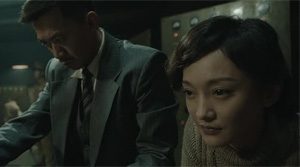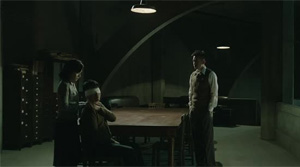

Ting fengzhe
China 2012
Genre:
Thriller
Director:
Alan Mak
Felix Chong
Cast:
Tony Leung Chiu Wai
Zhou Xun
Mavis Fan
Wang Xuebing
Dong Yong
Lam Wai

The Silent War
Story: It is the year 1949 and China is at war with an invisible enemy, the Kuomintang government that was forced to go to Taiwan into exile
and which once again wants to reach for power on Mainland China. A secret unit under the name "701" is assigned to overhear the enemy's radio channels and
decipher the broadcast Morse code. However, suddenly the channels vanish and the leader of the unit sends agent Zhang Xue-Ning (Zhou Xun) on
a mission to recruit an extraordinarily talented piano tuner for the unit. The mission proves to be difficult and she can't get near to the piano tuner,
but instead she recruits He Bing (Tony Leung Chiu Wai), his blind subordinate. Bing has an exceptional sense of hearing and within only a few days he finds
all new channels of the enemy. He is celebrated a hero, but actually he wants nothing more than to be close to Zhang. But she is often on missions somewhere
else in the country and gives him the cold shoulder. Instead Shen Jing (Mavis Fan) becomes a good friend to him, even though his heart always belongs to Zhang.
Review: When it comes to espionage thrillers like "The Silent War" there is inevitably coming to mind breathtaking tension and a complex story.
This is even more the case when you get to understand that directors Alan Mak and Felix Chong were behind the camera. But the creators of the
"Infernal Affairs" trilogy don't disappoint for the first time. Maybe expectations are simply especially high after their milestone work, but after a closer
look they still couldn't argue the rightful criticism that "The Silent War" remains without a soul at almost any time and lacks any true tension. Especially
during the emotional scenes it almost unpleasently catches the eye that we don't feel moved by the fate of the protagonists at all. And this even though
the movie doesn't go astray everywhere.

One of the movie's strength is the implied romantic story between Zhang and Bing, which nonetheless never has any momentum going and can't tap the full
potential it has on a subtle level either. Bing eventually meets another woman, but his feelings for Zhang remain strong and he makes no secret about it.
Tony Leung ("Lust, Caution", "In the Mood for Love") often portrays his character in a very playful manner, which makes him very likeable. It isn't his
best performance, but he has his moments. Zhou Xun ("Painted Skin: The Resurrection") steals the show from everyone else as usual. Her character is
cold, calculating and being an agent has given her a few demons to accompany her on her way. Nevertheless, she slowly warms up to Bing when close to him.

The reason for the need to desperately cling to the sadly not fully elaborated love story is that this is the only thread we get that runs through
the whole movie. The rest of the film revolves around the search for radio channels, which Bing apparently finds in a matter of seconds, and the head of
the enemy group within the country, who seemingly is impossible to find. Leung plays a blind man whose sense of hearing actually resembles some
sort of superhero power. He "sees" his surroundings with his ears and when necessary even makes use of that to shake off pursuers in a pretty impressive
way, even though in the end he doesn't manage to succeed doing so. In the Marvel superhero universe he would be everything but out of place, instead he
is in this thriller occasionally...
Of course you have to wonder what great task Bing has been assigned to after he effortessly found all the radio channels. Nothing special, at least no task
that none of the countless other agents couldn't perform. Accordingly, Bing doesn't know exactly where to head to next as is the case when looking at the
screenplay. The plot develops in an erratic and forced way and this although the story is based on the novel "Plot Against" by Mai Jia which surely could
have offered more than we get here. The story is woven pretty simple and this is actually the death blow to any espionage thriller, but sadly we don't even
care for any of the characters. The well done soundtrack by Chang Kwong Wing sometimes tempts us to become sentimental, but unfortunately we have no reason
for that and even the action Chang tries to underscore is simply not there.

What's also strange is the anticlimactic ending, making us wonder, in respect to the missing thrills as well, what the film actually aimed for. With its two hours running time the movie soon becomes tiring and all the nice polished looking pictures and the appealing sets and costumes don't suffice making us overlook this fact. You may give the Mainland China production credit for not simply drawing the enemy as evil, but there still remains something propaganda-like in the picture. So the question left when everything is said and done is how Mak/Chong actually imagined to create a captivating espionage thriller by letting Leung listen to a radio while someone at the other end of the line is panically tapping some Morse code. Despite its box-office success this one is a real disappointment.

Disclaimer


















